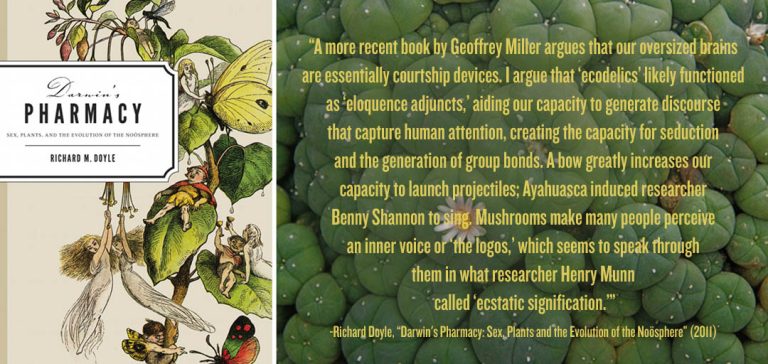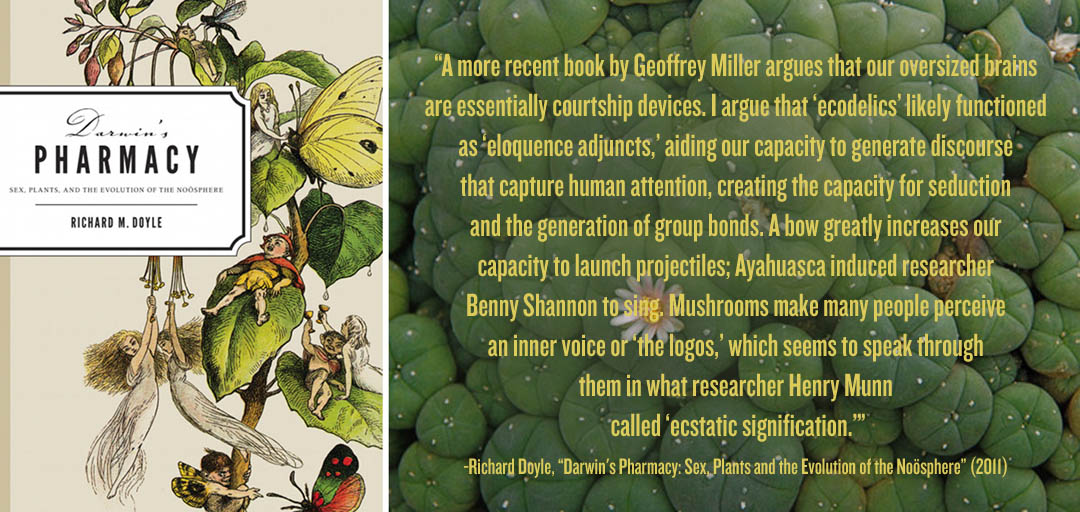Jason Silva recently posted a link on his Facebook page to an interview with Richard Doyle, whose latest book Darwin’s Pharmacy: Sex, Plants and the Evolution of the Noösphere asks the question: Are humans unwitting partners in evolution with psychedelic plants? The following is a brief summary of the book’s focus: Darwin’s Pharmacy weaves the evolutionary theory of sexual selection and the study of rhetoric together with the science and literature of psychedelic drugs. Long suppressed as components of the human tool kit, psychedelic plants can be usefully modeled as “eloquence adjuncts” that intensify a crucial component of sexual selection in humans: discourse. In doing so, they engage our awareness of the noösphere, defined by V.I. Vernadsky as the thinking stratum of the earth, the realm of consciousness feeding back onto the biosphere. Sharing intelligence, connecting with the noösphere and integrating individuality into its ecosystemic context offers powerful and promising ways to respond to ecosystems in crisis, and formed the backdrop of what Doyle dubs the “ecodelic” thought of the environmental movement. Yet current policies criminalize the use of plant-based psychedelics while simultaneously feeding a violent global black market for refined and chemically-derived drugs.
In this tour de force of “first-person science,” Doyle takes his readers on a mind bending journey through the work of William Burroughs, Kary Mullis, Lynn Margulis, Timothy Leary, Norma Panduro, Albert Hoffman, Aldous Huxley, Dennis and Terrence McKenna, John Lilly and Phillip K. Dick. Readers who take the journey that is Darwin’s Pharmacy will experience extraordinary insights into evolutionary theory, the war on drugs, the internet, and the nature of human consciousness itself. The following is an excerpt from Doyle’s recent interview with ACCELER8OR:
ACCELER8OR: So I feel like we’re dancing or skating around the core of your books theme… your essential thesis, if you will. Can you give us the short version?
RICHARD DOYLE: The book puts the human use of ecodelics into an evolutionary context. The human use of ecodelics is very old. Many researchers have wondered how psychedelics could be such a persistent part of human culture given the evolutionary pressures of natural selection. The idea is that it might be difficult to deal with the tiger at the edge of the village if it seems to have six heads or a thousand pairs of eyes. My argument is that we need to take a broader view of evolution to include the crucial and now recognized role of symbiosis and what Charles Darwin called “sexual selection” ― the competition for mates. The book argues that ecodelics likely played an integral role in the development of human consciousness through these two vectors of evolution. Why “Darwin’s Pharmacy?” In The Descent of Man, Darwin describes watching birds engage in competitive singing, and determined that the best singers usually left more progeny as a result of success in these singing “duels.” In the next chapter he discusses the evolution of the human voice in oratory ― he was arguing by implication that our capacity for speech and reason evolved through courtship. A more recent book by Geoffrey Miller argues that our oversized brains are essentially courtship devices. I argue that ecodelics likely functioned as “eloquence adjuncts,” aids to our capacity to generate discourse that capture human attention, creating the capacity for seduction and the generation of group bonds. A bow greatly increases our capacity to launch projectiles; Ayahuasca induced researcher Benny Shannon to sing. Mushrooms make many people perceive an inner voice or “the logos,” which seems to speak through them in what researcher Henry Munn called “ecstatic signification.” Peacocks display their fan of feathers to capture the attention of peahens, and mandrills eat Iboga roots (which are psychedelic) before engaging in highly ritualized combat that determines mate pairing. I just drank a double espresso to write this up. Are we still dancing?
Richard Doyle is professor of English and science, technology, and society at Pennsylvania State University. He is the author of On Beyond Living and Wetwares. You can read the entire fascinating ACCELER8OR interview with Richard Doyle by CLICKING HERE. To pick up your own copy of Darwin’s Pharmacy: Sex, Plants and the Evolution of the Noösphere (as well as to preview the first several pages) be sure to visit Amazon. And to read an equally terrific interview, check out this one-on-one between Jason Silva and Richard Doyle over at The Huffington Post. You can also read a lengthy excerpt from the book by visiting Reality Sandwich.



